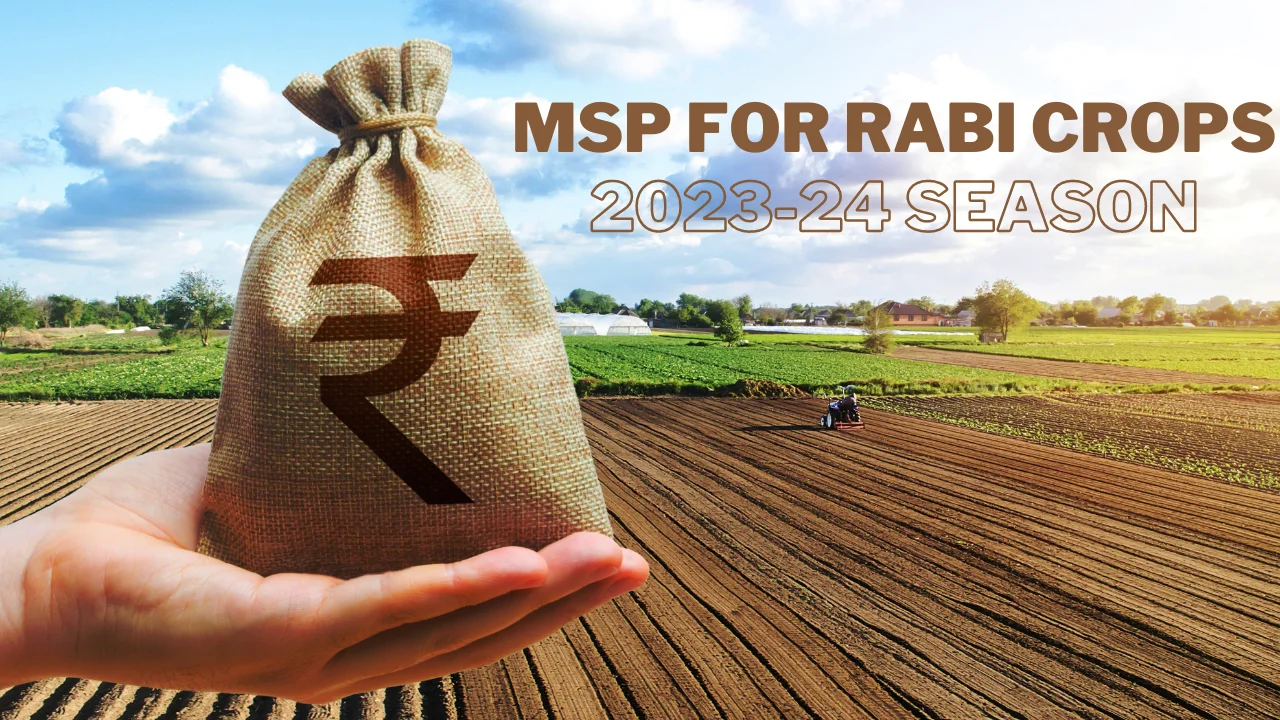New MSP for Rabi Crops
The Cabinet Committee on Economic Affairs, presided over by Hon’ble Prime Minister Shri Narendra Modi, has granted approval for raising the Minimum Support Prices (MSP) for all mandated Rabi Crops during the Marketing Season 2024-25. This move by the government involves an increase in the MSP of Rabi Crops for the said season, with the aim of ensuring that farmers receive remunerative prices for their produce. This decision underscores the government’s commitment to supporting and enhancing the income of agricultural producers.
Minimum Support Prices for all Rabi Crops for Marketing Season 2024-25
| S.No | Crops | MSP RMS2014-15 | MSP RMS 2023-24 | MSP RMS 2024-25 | Cost* of production RMS 2024-25 | Increase in MSP (Absolute) | Margin over cost (in %) |
| 1 | Wheat | 1400 | 2125 | 2275 | 1128 | 150 | 102 |
| 2 | Barley | 1100 | 1735 | 1850 | 1158 | 115 | 60 |
| 3 | Gram | 3100 | 5335 | 5440 | 3400 | 105 | 60 |
| 4 | Lentil (Masur) | 2950 | 6000 | 6425 | 3405 | 425 | 89 |
| 5 | Rapeseed & Mustard | 3050 | 5450 | 5650 | 2855 | 200 | 98 |
| 6 | Safflower | 3000 | 5650 | 5800 | 3807 | 150 | 52 |
Significance of MSP Increase for Rabi Crops
The decision to raise the MSP for mandated Rabi Crops during the Marketing Season 2024-25 aligns with the announcement in the Union Budget 2018-19, which aimed to fix the MSP at a minimum of 1.5 times the All-India weighted average Cost of Production. The expected margin over the All-India weighted average Cost of Production is 102% for wheat, 98% for rapeseed & mustard, 89% for lentil, 60% for gram, 60% for barley, and 52% for safflower.
This increase in MSP for Rabi Crops will provide farmers with remunerative prices for their produce and serve as an incentive for crop diversification. It is part of the government’s ongoing efforts to support and boost the agricultural sector in India.
Government’s Other Initiatives for Farmers
The Government is actively promoting crop diversification, particularly in oilseeds, pulses, and millet (Shree anna), with the objectives of enhancing food security, increasing farmers’ income, and reducing the reliance on imports. In addition to the Price Policy, several initiatives have been undertaken by the Government to support this effort, including the National Food Security Mission (NFSM), Pradhan Mantri Krishi Sinchayee Yojana (PMKSY), and the National Mission on Oilseeds and Oil Palm (NMOOP). These initiatives provide financial support and quality seeds to encourage farmers to cultivate oilseeds and pulses.
To ensure that the benefits of the Kisan Credit Card (KCC) Scheme reach every farmer in the country, the Government has launched the Kisan Rin Portal (KRP), KCC Ghar Ghar Abhiyaan, and the Weather Information Network Data Systems (WINDS). These initiatives are designed to offer timely and accurate weather information to empower farmers to make informed decisions about their crops. They collectively aim to revolutionize agriculture, enhance financial inclusion, optimize data utilization, and improve the livelihoods of farmers throughout the nation.
What is MSP?
Minimum Support Price is a form of market intervention by the Government of India to insure agricultural producers against any sharp fall in farm prices. MSP is a price fixed by the Government of India to protect the producers – farmers – against excessive falls in price during bumper production years. The minimum support prices are a guaranteed price for their produce from the Government.
- The MSP is a key component of the Indian government’s agricultural policy.
- The MSPs are announced by the Government of India at the beginning of the sowing season for certain crops.
- It is designed to protect farmers from price volatility and to ensure that they receive a fair price for their produce.
- The MSP is announced for 23 crops, including wheat, rice, pulses, oilseeds, and cotton.
- The government procures these crops at the MSP from farmers through the Food Corporation of India (FCI) and other agencies.
The MSP is an important tool for supporting farmers and ensuring food security in India. However, it has also been criticized for being too costly and for distorting the market.
Benefits
- It protects farmers from price volatility.
- It ensures that farmers receive a fair price for their produce.
- It helps to increase agricultural production.
- It contributes to food security in India.
Criticisms
- It is too costly.
- It distorts the market.
- It encourages farmers to grow crops that are not necessarily in the best interests of the country.
- It leads to the overproduction of some crops.
The MSP is a complex issue with both benefits and drawbacks. It is important to weigh the pros and cons carefully when making decisions about agricultural policy.
How MSP is calculated?
The Minimum Support Price is calculated by the Commission for Agricultural Costs and Prices (CACP), which is an advisory body to the Government of India. The CACP considers a number of factors when calculating the MSP, including:
- Cost of cultivation: This includes the cost of inputs such as seeds, fertilizers, pesticides, and labor.
- Market prices: The CACP considers the market prices of crops over the past few years when setting the MSP.
- Inter-crop price parity: This ensures that farmers receive a fair price for their produce relative to other crops.
- Terms of trade between agriculture and non-agriculture: This ensures that farmers are not disadvantaged relative to non-agricultural sectors.
- Likely implications of MSP on consumers of that product: The CACP also considers the impact of the MSP on consumers when setting the price.
The CACP submits its recommendations for the MSP to the Government of India, which then makes a final decision on the MSP.
- Weekly Current Affairs 2025 PDF For Bank, SSC, UPSC Exams
- Unsung Heroes of India: 10 Unknown Freedom Fighters You Should Know
- 26 December Current Affairs 2023 in English
- Daily Current Affairs 2025, Check Today’s Current Affairs
- April Month Current Affairs 2024, Download PDF
- June Month Current Affairs 2024, Download PDF

Hello, I’m Aditi, the creative mind behind the words at Oliveboard. As a content writer specializing in state-level exams, my mission is to unravel the complexities of exam information, ensuring aspiring candidates find clarity and confidence. Having walked the path of an aspirant myself, I bring a unique perspective to my work, crafting accessible content on Exam Notifications, Admit Cards, and Results.
At Oliveboard, I play a crucial role in empowering candidates throughout their exam journey. My dedication lies in making the seemingly daunting process not only understandable but also rewarding. Join me as I break down barriers in exam preparation, providing timely insights and valuable resources. Let’s navigate the path to success together, one well-informed step at a time.






